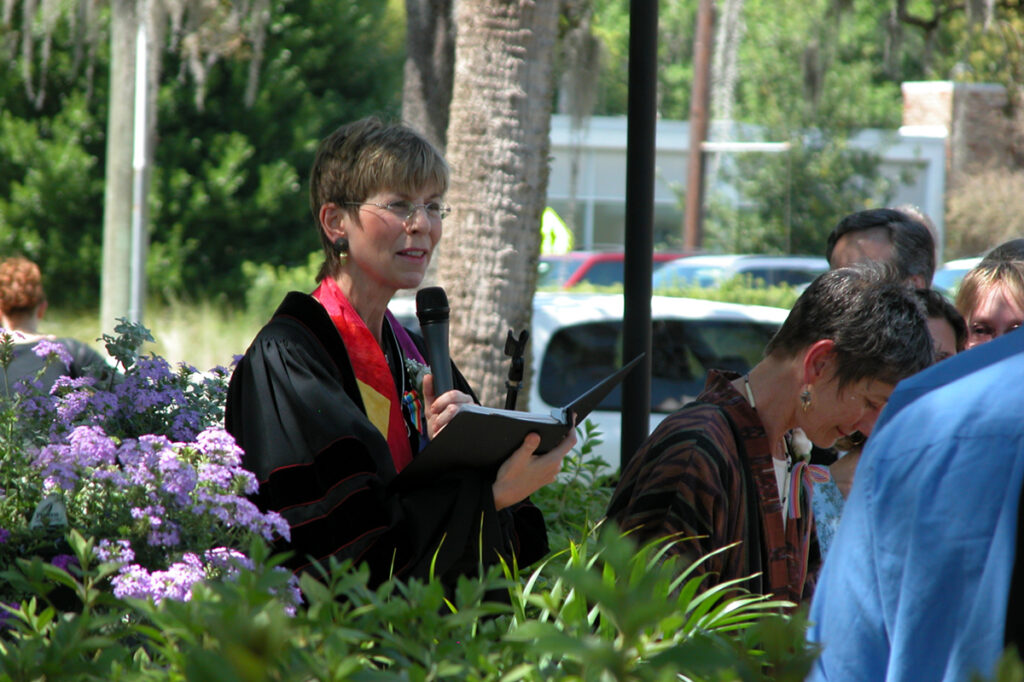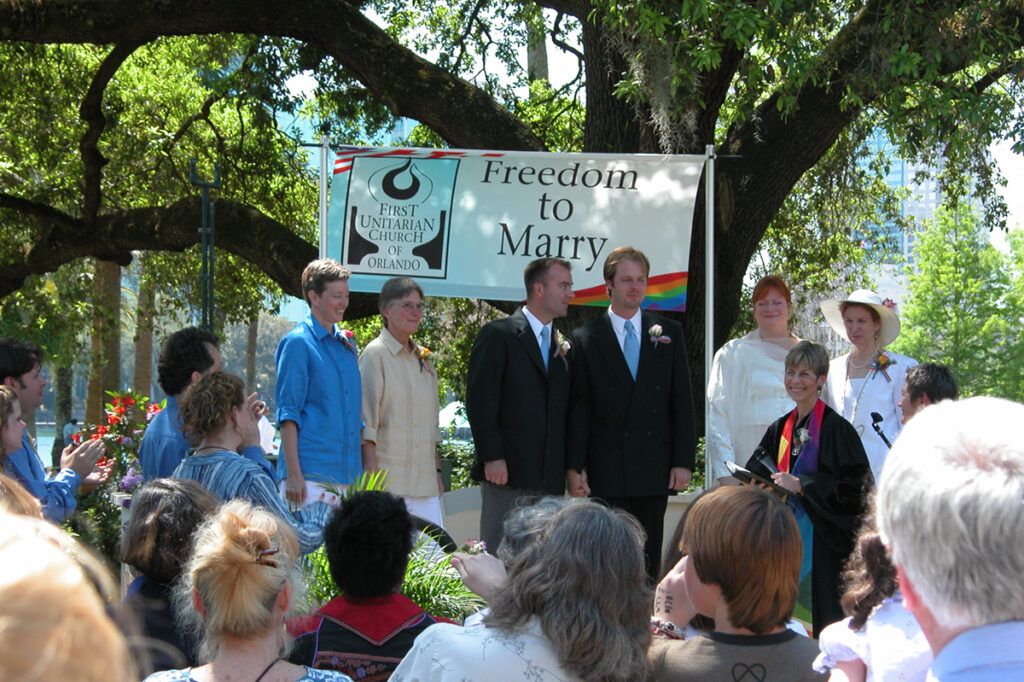By Justine Truc, 2024 University of South Carolina Oral History Fellow
Through the generosity of one of our donors, the Orange County Regional History Center offers two paid fellowships each summer through the University of South Carolina’s graduate public history program. These virtual fellowships typically involve working with the museum’s oral history collection as well as learning about other departments and career opportunities in museums. Fellows write an essay to chronicle and contextualize the work they conduct in the History Center’s oral history collection, which covers a wide range of topics, including stories on social justice advocacy. One such story is that of the Rev. Marni Harmony, whose unwavering dedication to LGBTQ+ rights and civil liberties was displayed in her oral history interview on July 7, 2021. We begin with a brief overview of the history of Unitarian Universalism, which played a significant role in Rev. Harmony’s advocacy.
Fighting for racial equality and LGBTQ+ rights, the Unitarian Universalist Association has advocated fiercely for equal rights nationwide. After their merger in 1961, the American Unitarian Association and the Universalist Church of America formed the Unitarian Universalist Association, which continued to play a pivotal role in the landscape of liberal religion in the United States.
In 1973, the Unitarian Universalist Association became the first denomination to establish an office dedicated to LGBTQ+ issues. By 1984, the association had also officially recognized and performed same-sex marriages, reflecting its commitment to equality and inclusion.
When the Supreme Court’s 2015 decision in Obergefell v. Hodges legalized same-sex marriage nationwide, Unitarian Universalists celebrated this victory and hoped to see more positive developments for LGBTQ+ rights in the future.
That included the First Unitarian Church of Orlando, founded in 1912. There, during her 20-year tenure as minister from 1988 to 2008, the Rev. Marni Harmony fought hard to protect and improve the rights of a group facing social stigma and legal challenges.
From personal discovery to social justice
Marni Politte Harmony was born in Virginia in 1948. Growing up, she quickly developed a strong interest in religious studies, following in the footsteps of her father, who was “on a pretty deep spiritual journey all his life.” She pursued her passion at Tuft University, where she majored in religious studies and sociology and later joined the Boston University School of Theology on a scholarship. Before moving to Central Florida in the late 1980s, she traveled across the country, always eager to learn more about her faith.
Rev. Harmony’s path to becoming a Unitarian Universalist minister was marked by both personal and professional exploration. After moving to Orlando in 1988 to work for the First Unitarian Church and getting a divorce from her husband, she “began to have inklings that [she] might be bisexual.” She had never been taught about homosexuality, and coming to terms with her sexuality in the 1980s was not easy. She believes that, “had the word ‘bisexual’ been as understood [as it was at the time of her oral history interview in 2021], it might have been very helpful” for her.
In Orlando, Rev. Harmony found herself involved with a church that welcomed the LGBTQ+ community. She was able to come out to her church and started helping local organizations in their work toward social justice. She noticed that “we had to go through a phase of people being afraid and not wanting to join because we’d be known as the gay church,” but she always kept the doors of her church open to organizations such as the Hope & Help Center, the Orlando Gay Chorus, and the Delta Youth Alliance (now the Orlando Youth Alliance), as they were in “sympathy with our purposes and principles.”

Photo courtesy of Marni Harmony
March on City Hall, 2004
In March 2004, Rev. Harmony decided to protest the legal discrimination faced by same-sex couples. Noticing that “some of [her] colleagues were beginning to do all kind of protest things,” she turned to her congregation at First Unitarian Church of Orlando during one of her sermons to ask for support: she invited twelve gay couples to apply for marriage licenses at the Orange County Courthouse, fully aware that they would be turned down.
This act, in her eyes, was more than a symbolic gesture. It was an act of civil disobedience to highlight the injustices faced by LGBTQ+ couples. With the support of the Rev. William Sinkford, president of the national Unitarian Universalist Association, she decided to “march down to city hall to ask for licenses” on Friday, March 16, 2004. Anticipating a refusal, she planned to go to “Lake Eola and have a wedding.” Rev. Harmony wanted to keep that day “very, very secret” to ensure a peaceful ceremony for all participants. And, as she recalls, “it was a gorgeous day” where everything felt right and simple. She personally renewed her vows with her wife, Nancy, married some close friends, and enjoyed a performance by the Orlando Gay Chorus.

Photo courtesy of Marni Harmony
Rev. Harmony retired from professional ministry in 2013. Her service included a distinguished 20-year tenure at the First Unitarian Church of Orlando, becoming its longest-serving minister at the time. She continues to actively support LGBTQ+ rights and women’s rights through the Unitarian Universalist Retired Ministers and Partners Association. At the time of her oral history interview with the History Center in 2021 and today, she lives in Central Florida, enjoying a peaceful life with her wife, Nancy. She is minister emerita of First Unitarian of Orlando.
A bumpy road in the Sunshine State
Although the 2015 Supreme Court decision in Obergefell v. Hodges legalized same-sex marriage nationwide and brought hope to many, conditions for the LGBTQ+ community in Florida did not necessarily improve.
In recent years, the Pulse Nightclub shooting in 2016 highlighted the ongoing violence and discrimination still faced by the LGBTQ+ community in the twenty-first century. Additionally, recent legislative setbacks such as the “Fairness in Women’s Sports Act” of 2021, which restricts the rights of transgender women, and the “Parental Rights in Education Act” of 2022, limiting discussions of sexual orientations and gender identity in schools, demonstrate that the LGBTQ+ community continues to face ongoing challenges in Florida.

